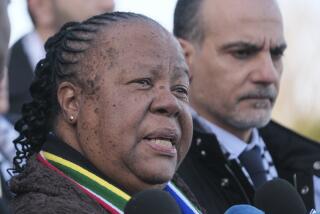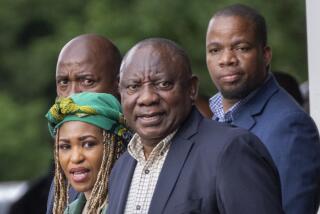Black Neighbors Say S. Africa Risks War in Region, Blame Pretoria in Death of Machel
- Share via
MAPUTO, Mozambique — The leaders of the black-ruled states around South Africa warned Wednesday that tension is rising dangerously in the region and that Pretoria appears to be risking open warfare with its neighbors.
The six “front-line states” accused South Africa’s white-led minority government of increasing its effort to destabilize them and of mounting frequent clandestine attacks on them.
They also said that Pretoria was to blame, at least indirectly, for the air crash that killed President Samora M. Machel of Mozambique and 33 others on Oct. 19 just inside South Africa’s border with Mozambique.
Wants Proof of Innocence
“A number of countries hold South Africa directly responsible until they have proved the contrary,” President Kenneth D. Kaunda of Zambia, the meeting’s chairman, said. He cited “a whole history” of clandestine South African attempts in recent years to undermine the governments of neighboring countries because of their support of the campaign against apartheid.
Kaunda said there are strong suspicions among the front-line states that Machel’s plane was drawn off course by false electronic or radio signals from South Africa and that, as a result, it crashed into a wooded hillside. Machel was returning from a meeting of African leaders.
Only four days before the crash, Kaunda said, the South African defense minister, Gen. Magnus Malan, had threatened Mozambique and Machel personally if they continued to support “liberation movements,” such as the African National Congress, fighting white minority rule in South Africa.
Even if direct South African involvement could not be proved by the official investigation, Kaunda said, “in general terms, South Africa is still responsible because apartheid is responsible for all our distress in this region.”
Consultations After Funeral
Machel was buried here Tuesday. The presidents or prime ministers of Angola, Botswana, Tanzania, Zambia and Zimbabwe, the other front-line states in addition to Mozambique, stayed on for discussions with Mozambique’s interim leadership.
The leaders of the African National Congress, the Pan Africanist Congress of Azania and the South-West Africa People’s Organization also took part in the talks as the major groups fighting white rule in South Africa and neighboring Namibia, or South-West Africa.
Machel’s death poses two major problems for the front-line states, according to senior officials from several of the countries.
If South Africa planned Machel’s death, then the front-line states must assume that they are all in danger of both open and clandestine attacks by Pretoria and must plan coordinated defense measures, these officials said.
‘Prepare for War’
“We cannot wait for a report that may be months in coming and might be inconclusive,” one senior delegation member said, asking that he and his country not be identified. “That would be irresponsible . . . and in these circumstances the responsible course seems to be to prepare for war and to coordinate our efforts for maximum security. Machel’s death has raised tension to that level.”
The second problem, conference sources said, is the loss of Machel’s strong and charismatic personality and his personal dedication to bringing an end to apartheid, South Africa’s system of racial separation and minority white rule.
“With his own credentials as the leader of his country’s liberation struggle and as a revolutionary of international stature, Machel was a tower of strength for us,” another conference participant said.
“Even after he signed the Nkomati Accord (a nonaggression pact concluded in March, 1984, with South Africa) and closed the ANC bases, his political support for the liberation movements was unwavering and sustained them in moments of crisis. He will be missed for his leadership.”
‘A Hero of Heroes’
Kaunda praised Machel at the opening of the summit meeting as “a hero of heroes, a leader of leaders.”
“We mourn a truly great man,” Kaunda said. “He has fallen at the hands of wicked men, political imbeciles, historically inept people (in South Africa) who do not understand what this is all about. . . . We must shame those who thought they would destroy him.”
Asked about the rightist Mozambique National Resistance movement’s “declaration of war” on Zimbabwe, attacking military and economic targets because of Zimbabwe’s military assistance to the Mozambique government, Kaunda said this was further evidence of the South African effort to destabilize the region.
More to Read
Sign up for Essential California
The most important California stories and recommendations in your inbox every morning.
You may occasionally receive promotional content from the Los Angeles Times.











